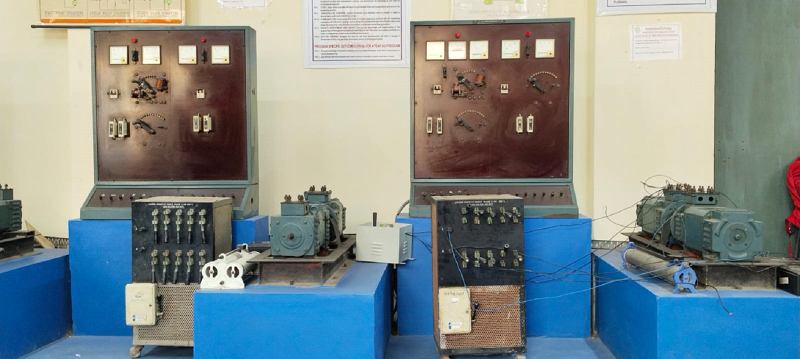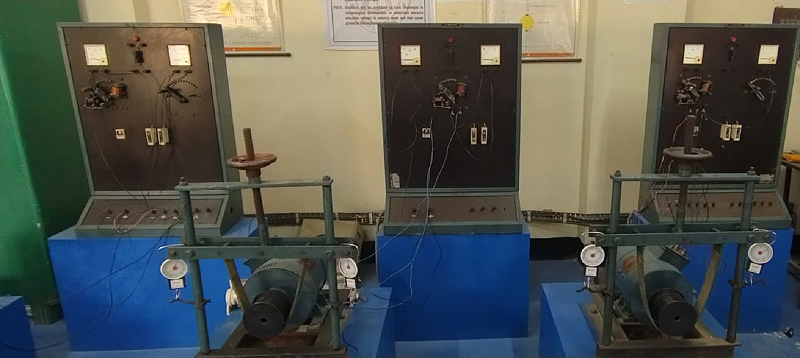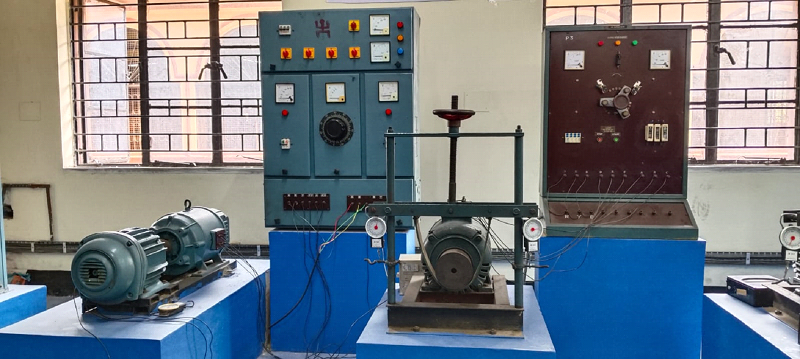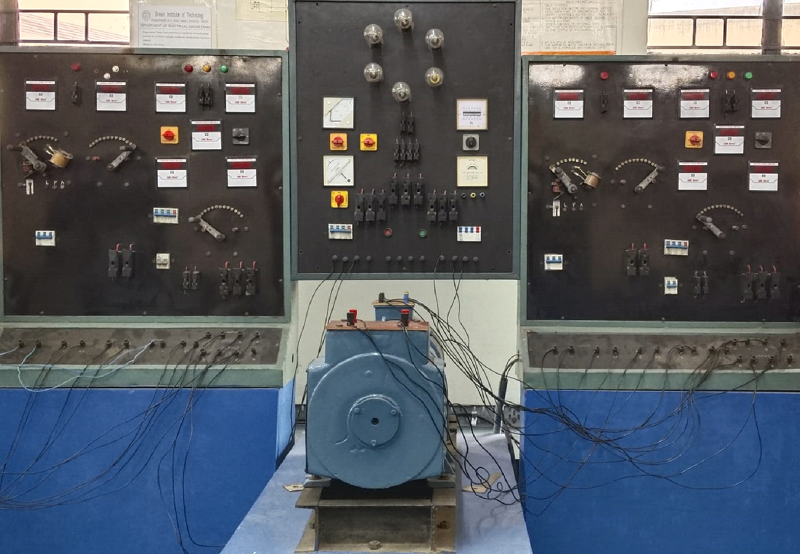| DEPARTMENT |
NAME OF THE SUBJECT WITH COURSE CODE |
SYLLABUS (NEW/OLD) |
YEAR & SEMESTER |
| EE |
Electrical Machine I Lab (PC-EE-491) |
NEW |
2nd year 4th Sem (UG) |
| EE |
Electrical Machine II Lab (PC-EE-591) |
NEW |
3rd Year 5th Sem (UG) |
Objective:
The objective of Electrical Machine I & II laboratory is to provide students with hands-on experience and practical understanding of the concepts learned in the theoretical aspects of Electrical Machine. Some specific objectives include:
- • Understanding Concepts: Reinforcing theoretical knowledge by applying it to practical scenarios, helping students understand the fundamental concepts of Electrical Machine.
- • Skill Development: Developing practical skills in designing, analysing, and implementing circuits and Control of the Electrical Machine systems.
- • Experimental Validation: Validating theoretical concepts through experimentation, allowing students to observe real-world behaviours and phenomena in Electrical Machine.
- • Troubleshooting: Developing problem-solving abilities by troubleshooting and diagnosing faults in Electrical Machine.
- • Safety Awareness: Instilling a strong sense of safety protocols and practices when working with Electrical Machine.
- • Project Work: Providing opportunities for students to work on projects that involve the design, simulation, and implementation of Electrical Machine.
- • Integration with Industry: Bridging the gap between academia and industry by exposing students to state-of-the-art equipment and technologies used in Electrical Machine applications.
Overall, the Electrical Machine I & II laboratory aims to equip students with the practical skills and knowledge necessary to excel in the field of electric drives, renewable energy systems, and related areas.
Course covered in this Laboratory:
COURSE OBJECTIVES
- • To expose the students to the operation of DC Generator.
- • To expose the students to the operation of DC Motor.
- • To expose the students to the operation of Single-Phase Transformer.
Electrical Machine I Lab (PC-EE-491)
The following experiments are required to be conducted compulsory experiments:
- Determination of the characteristics of a separately excited DC generator.
- Determination of the characteristics of a DC motor
- Study of methods of speed control of DC motor
- Determination of the characteristics of a compound DC generator (short shunt)
- Determination of speed of DC series motor as a function of load torque.
- Polarity test on a single phase transformer
- Determination of equivalent circuit of a single phase transformer and efficiency.
- Study of different connections of three phase transformer.
- Study of Parallel operation of a single phase transformer.
- Determination of temperature rise and efficiency of the transformer. (Back to back test)
Course outcome: After completion of this course, the learners will
- • Be able to systematically obtain the equations that characterize the performance of an DC electric Motor as well as Generator and Transformer.
- • Acknowledge the principles of operation and the main features of electric machines and their applications.
- • Acquire skills in using electrical measuring devices.
Course covered in this Laboratory
COURSE OBJECTIVES:
- ⦁ To expose the students to the operation of synchronous machines.
- ⦁ To impart knowledge on voltage regulation of alternators.
- ⦁ To expose the students to the operation of induction motors.
- ⦁ To impart knowledge on equivalent circuit of the induction motors.
- ⦁ To impart knowledge on necessity of starters.
Electrical Machine II Lab (PC-EE-591)
- Different methods of starting of a 3 phase Cage Induction Motor & their comparison [DOL, Auto transformer & Star-Delta]
- Study of equivalent circuit of three phase Induction motor by no load and blocked rotor test.
- Study of performance of wound rotor Induction motor under load.
- Study of performance of three phase squirrel- cage Induction motor –determination of iron-loss, friction & windage loss.
- Speed control of 3 phase squirrel cage induction motor by different methods & their comparison [voltagecontrol & frequency control].
- Speed control of 3 phase slip ring Induction motor by rotor resistance control.
- Determination of regulation of Synchronous machine by
- ⦁ Potier reactance method.
- ⦁ Synchronous Impedance method.
- Determination of equivalent circuit parameters of a single phase Induction motor.
- Load test on single phase Induction motor to obtain the performance characteristics.
- To determine the direct axis resistance [Xd] & quadrature reactance [Xq] of a 3 phase synchronous machine by slip test.
- Load test on wound rotor Induction motor to obtain the performance characteristics.
- To make connection diagram to full pitch & fractional slot winding of 18 slot squirrel cage Induction motor for6 poles & 4 pole operation
- To study the performance of Induction generator
- Parallel operation of 3 phase Synchronous generators
- V-curve of Synchronous motor.
Course outcome: After completion of this course, the learners will
Ability to understand the importance of Induction machines.
Ability to acquire knowledge on separation of losses.
Ability to understand and analyse EMF and MMF methods.
Ability to understand the importance of Synchronous machines.
Ability to analyse the characteristics of V and Inverted V curves
Major Facilities available in this laboratory:
- Motor, Generator, Single phase and Three Phase Transformer set.
- Resistive and Capacitive load. (single phase & three phase)
- Volt-meter, Ammeter, Watt-meter, Power factor meter, Frequency meter & Phase sequence meter.



